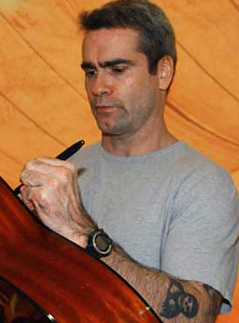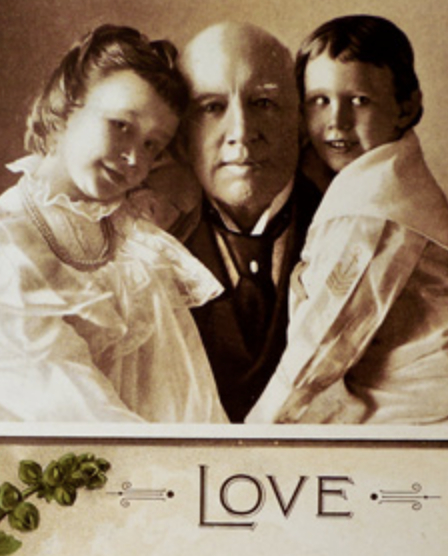February 13
Henry Rollins

On this date in 1961, Henry Rollins (né Henry Lawrence Garfield) was born in Washington, D.C. After high school, Rollins worked on the crew of several D.C. punk bands including Teen Idles. He sometimes filled in for absent lead singers. By 1980, talk of his vocal ability had spread around the D.C. punk rock scene. Rollins became the lead vocalist and lyricist of a band called State of Alert. He was promoted to manager of an ice cream store in Georgetown, which he used to fund his musical hobby.
Rollins became a huge fan of the punk band Black Flag, exchanging letters with its bassist and attending as many concerts as he could and even putting the band up in his parents’ home during an East Coast tour. The band was won over by Rollins’ vocal talent and stage presence. He joined Black Flag as its new frontman and lead singer, quit his manager position, changed his name from Garfield to Rollins and moved to Los Angeles.
Black Flag disbanded in 1986, but Rollins was already touring successfully as a solo artist. He released three solo albums in 1987: Hot Animal Machine, with guitarist Chris Haskett, Drive by Shooting and Big Ugly Mouth. In that same year, Rollins assembled an alternative hard rock group called Rollins Band, active until 2003. Their first chart-topping album was The End of Silence (1992). In 2000, Rollins Band was 47 on VH1’s list of 100 Greatest Artists of Hard Rock. Rollins won a Grammy Award in 1995 for Best Spoken Word Album for Get in the Van: On the Road with Black Flag, a recording of Rollins reading his memoir of the same title.
Rollins has appeared on numerous television series, including MTV’s “Oddville,” (1997), “Batman Beyond” (2001), “The Henry Rollins Show” (2006-2007) and “Sons of Anarchy” (2009). He has authored several books, including a trilogy based on his travels called Black Coffee Blues (1992). He has also appeared in over a dozen films, including “Heat” (1995) with Al Pacino, “Lost Highway” (1997) with Bill Pullman, “Jackass The Movie” (2002) and “Jackass The Movie Two” (2006). Rollins is an activist for gay and human rights. An outspoken war critic, he is strongly supportive of troops.
Rollins said on SIRIUS XM radio: “I’m sure there’s gay people who are Catholics. How do they reconcile that? How do they reconcile that somewhere in the paperwork their religion doesn’t like them?” (“Ron & Fez on The Virus,” video, date unknown). On the same show, Rollins reacted to the expulsion of the child of two lesbians from a Catholic preschool: “When you encounter that kind of hatred, leave. … I was happy that the kid got expelled because maybe the kid has a chance now. They can be put into a place without discrimination, that doesn’t eventually make part of the curriculum to exclude people, like homosexuals.”
Rollins occasionally used “The Henry Rollins Show” to passionately critique religion: “Christian fundamentalists see their fingers being pulled off the steering wheel as their oppressive shackles are more and more being seen as fear-based nonsense” (video, date unknown). Friends with actor William Shatner, he contributed to the mostly secular “Shatner Claus: The Christmas Album” in 2018.
PHOTO: Rollins signing an airman’s guitar during a 2003 USO tour in Iraq.
“In the theory of evolution there is no talk of God and no Bibles are used. They’re not looking for higher powers, extraterrestrials, or anything else that could be found in the science fiction section, because they are not dealing with fiction.”
—Henry Rollins, on an episode of "The Henry Rollins Show” (date unknown)
Marriage of Robert Green Ingersoll and Eva Parker

On this date, the day before Valentine’s Day in 1862, Robert Green Ingersoll and Eva Amelia Parker were married. Ingersoll, a Civil War officer, attorney and spell-binding orator, became the leading advocate of freethought in 19th-century America. The son of a minister credited his freethinking wife with his rejection of religion. Eva was the granddaughter of Sarah Buckman Parker, a noted infidel, and the daughter of firm rationalists. Robert was 29 and Eva was 21. “She is a good, natural, sweet woman. One that loves me and one that I love — that is enough,” he wrote at the time. In dedicating his first book, Some Mistakes of Moses, to her, he called Eva “a woman without superstition.”
Ingersoll was famously devoted to his family. Rumor by critical religionists had it that Ingersoll’s son was a drunkard who frequently had to be carried away from the table. Ingersoll’s famous response was: “It is not true that intoxicating beverages are served at my table. It is not true that my son ever was drunk. It is not true that he had to be carried away from the table. Besides, I have no son!” The loving extended family household included daughters Maud and Eva, Eva’s husband, Ingersoll’s mother-in-law, his wife’s sister and husband, and their child.
PHOTO: The orator with grandchildren Eva Ingersoll Wakefield and Robert G. Ingersoll Brown.
Love is the magician, the enchanter,
—From Ingersoll's 1884 lecture "Orthodoxy," published in "The Works of Robert G. Ingersoll," Vol. 2 of 12 (the Dresden edition, 1900)
That changes worthless things to joy,
And makes right royal kings and queens of common clay.
Love is the perfume of that wondrous flower, the heart;
And without that sacred passion,
That divine swoon, we are less than beasts;
But with love, earth is heaven, and we are gods.
